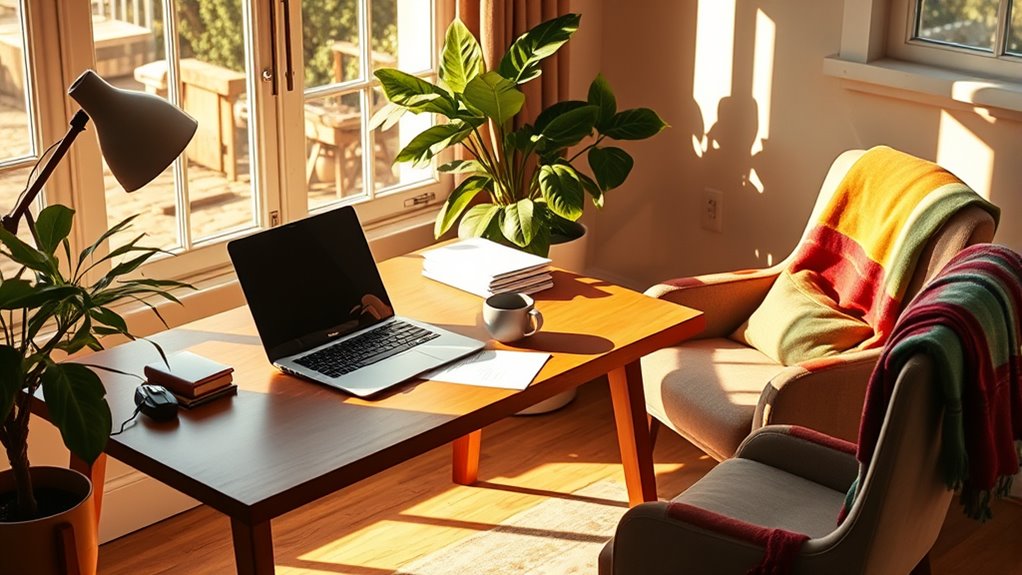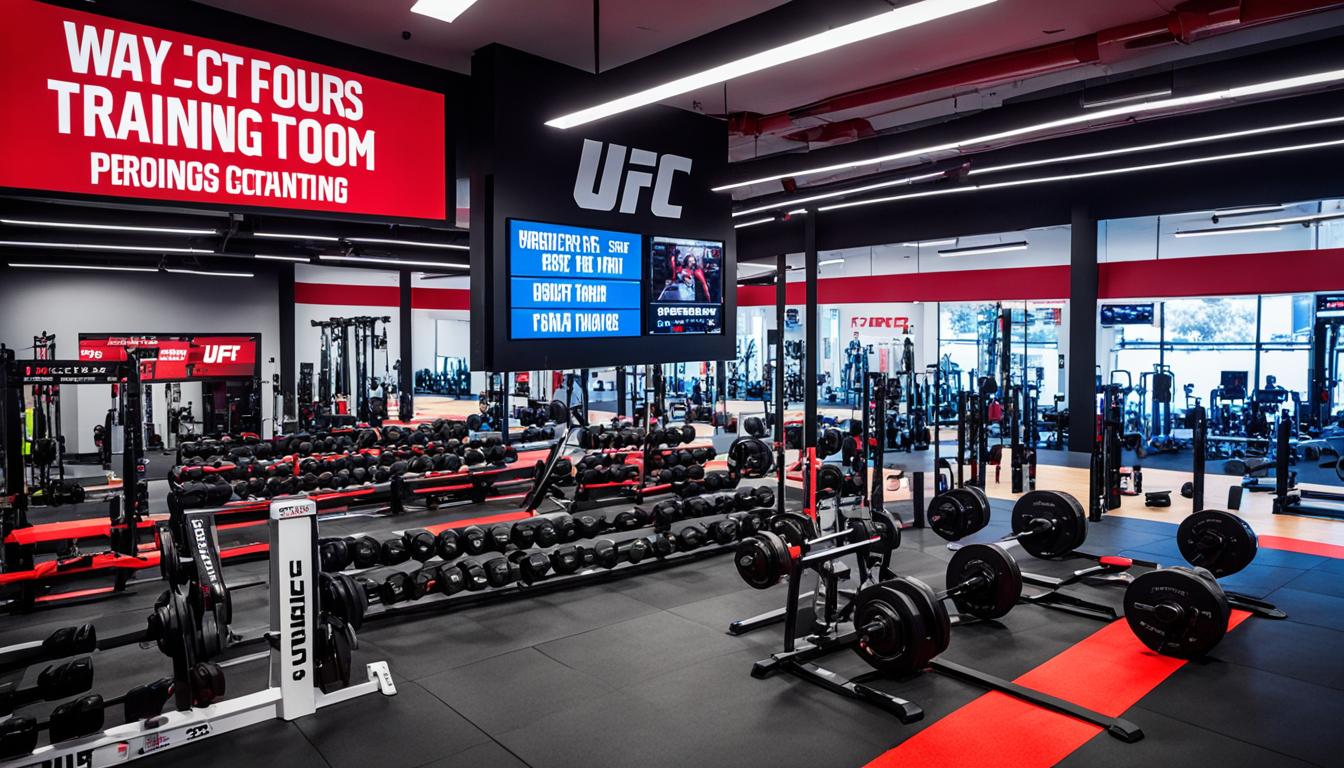To maintain a healthy work-life balance, set clear boundaries for your desk hours and stick to them. Use ergonomic setups to stay comfortable, and take regular breaks to stretch and refresh. Embrace flexible work options like hybrid or flexible hours to better fit personal routines. Clear policies and mindful organization help prevent burnout and promote well-being. Keep exploring these strategies to create a sustainable, balanced professional life that supports your health and happiness.
Key Takeaways
- Implement ergonomic workspace setups to reduce physical strain and enhance comfort during desk hours.
- Use time management techniques and regular breaks to prevent fatigue and promote productivity.
- Adopt flexible work arrangements like hybrid or flexitime to better balance work and personal life.
- Follow organizational policies that encourage boundaries and ergonomic assessments for healthier desk habits.
- Effective desk hour management improves overall well-being, job satisfaction, and prevents burnout.

Have you ever felt overwhelmed by long hours at your desk, wondering how it’s affecting your work and health? If so, you’re not alone. Managing desk hours effectively starts with establishing a solid ergonomic setup and practicing good time management. An ergonomic setup means creating a workspace that supports your body’s natural posture, reducing strain and preventing discomfort. Proper chair height, monitor placement, and keyboard positioning help you avoid musculoskeletal issues linked to prolonged sitting. When your workspace is ergonomically sound, it becomes easier to focus and sustain productivity without sacrificing your physical health. Research shows that proper ergonomics can significantly reduce fatigue and discomfort for desk workers. Additionally, incorporating AI-driven ergonomic assessments**** can help tailor your workspace to your specific needs, further enhancing comfort and efficiency.
Time management plays a *vital* role in maintaining work-life balance during desk hours. By planning your day and prioritizing tasks, you prevent work from spilling over into personal time. Break your work into manageable chunks, and schedule regular short breaks to stretch and move around. These pauses not only reduce physical strain but also refresh your mind, boosting your overall efficiency. Setting clear boundaries around your work hours is equally important. When you respect these limits, you lessen the risk of burnout and *guarantee* you have quality personal time to recharge.
Flexible work arrangements can *considerably* improve how you manage your desk hours. Hybrid models, which allow splitting time between home and the office, give you scheduling flexibility. Flexitime lets you choose hours that align with your personal commitments, helping you avoid conflicts and stress. Asynchronous work practices mean you can perform tasks during your most productive times, outside rigid schedules. These approaches foster autonomy, creativity, and job satisfaction while reducing the pressure to be constantly connected. They also help you better balance work demands with your personal life, making it easier to stick to a healthy routine.
Supporting a healthy work-life balance isn’t just about personal effort; organizational policies matter too. When your employer encourages flexible work options, provides ergonomic assessments, and promotes open communication, it becomes easier to manage desk hours effectively. Managers who lead by example—setting boundaries and respecting employees’ personal time—set a positive tone that encourages others to follow suit. Implementing strategies like regular breaks, clear work boundaries, and technology tools for remote work can help you stay on track without sacrificing well-being.
Ultimately, managing your desk hours with a focus on ergonomic setup and time management leads to better health, increased job satisfaction, and sustained productivity. By taking proactive steps and utilizing flexible arrangements, you can create a healthier balance that benefits both your professional performance and personal life.
Frequently Asked Questions
How Do Desk Hours Affect Employee Productivity?
You might notice that your desk hours directly impact your productivity. When you maintain focused routines, like taking regular breaks in the break room and ensuring ergonomic setups, you stay more alert and efficient. Extended hours often lead to fatigue and lower output, especially if you skip breaks or neglect comfort. By managing your desk hours, incorporating proper ergonomics, and taking mindful breaks, you can boost your overall productivity and well-being.
What Are the Legal Regulations Regarding Desk Hours?
Think of your work hours as the compass guiding your journey. You must navigate with care, respecting the laws that anchor your path. Work hour policies shape how long you can steer your ship, ensuring legal compliance and fair treatment. These regulations specify limits, breaks, and scheduling rules, so you stay within safe waters. By following them, you safeguard your rights and maintain a steady course toward productivity and well-being.
How Can Remote Workers Manage Desk Hours Effectively?
To manage your desk hours effectively, start by setting a structured routine and using time tracking tools like Toggl to monitor your work hours. Make certain your ergonomic setup is comfortable, with proper lighting and furniture, to prevent fatigue. Take regular breaks to stay focused and avoid burnout. Clear boundaries with family help maintain discipline, and leveraging technology like task management apps keeps you organized throughout your workday.
Are Flexible Desk Hours Better for Mental Health?
Oh, sure, flexible schedules are just a magic bullet for mental well-being—said no one ever. But in reality, they do help reduce stress, improve work-life balance, and boost job satisfaction. When you control your hours, you’re more likely to feel autonomous and less overwhelmed. Overall, flexible desk hours are better for mental health because they empower you to manage your time, leading to a healthier, happier work life.
How Do Desk Hours Influence Company Culture?
Your desk hours shape company culture by influencing office etiquette and overall engagement. When employees have flexible hours and dress casually, it fosters a relaxed environment that promotes trust and collaboration. Regular in-person days and social interactions boost morale, while leadership that values feedback and recognition strengthens bonds. Balancing desk hours creates a positive culture where employees feel valued, connected, and motivated to contribute, ultimately enhancing company success.
Conclusion
As you close your laptop and step away from your desk, imagine the warmth of the evening sun spilling through the window, casting gentle shadows across your space. By setting clear boundaries and embracing your off-hours, you create a balanced rhythm that refreshes your mind and rejuvenates your spirit. Remember, your workday isn’t just about the hours at your desk—it’s about making room for the moments outside it that truly nourish you.










